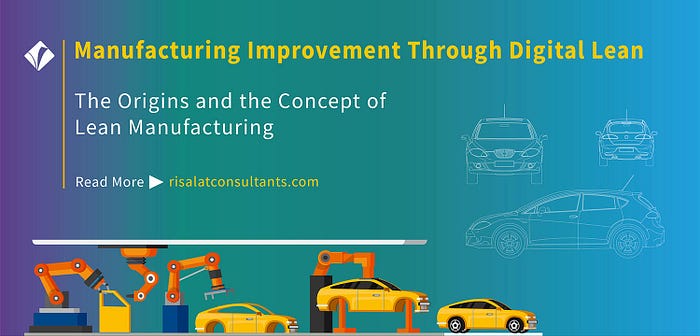Manufacturing Improvement Through Digital Lean by Risalat Consultants

Manufacturing Improvement Through Digital Lean
The Origins and the Concept of Lean Manufacturing
Toyota Production System (TPS) is one of the world’s most successful manufacturing stories that has turned into a global philosophy of process optimization. TPS is widely known as “lean manufacturing”, where waste is minimized by eliminating production activities that create no value to the customers. Typical wastes for manufacturing environments are categorized into 7 classes and for each, there is a strategy that reduces or eliminates its effect on the organization.
- Overproduction
- Waiting Time
- Transportation
- Excess/Unnecessary Inventory
- Excess Motion
- Defects
- Over-Processing
The ultimate goal of lean manufacturing is to limit the resources used in the manufacturing system to only those that are needed. As a result, the companies that employ lean manufacturing principles can reduce production costs, offer products with competitive prices on the market, and increase profit and ROI. Although many consider lean to be relevant to manufacturing solely, in practice it can successfully be applied in a wide number of industries and domains. However, it’s worth noting that lean production methods are not as good for every organization. Industries with stable product specifications, long lead times, and few impulse purchases are the ones to benefit the most.
A New Era of Lean
The new age of digitalization and automation has forever altered the image of production. Advances in robotics, materials, and AI have powered new accomplishments of cohesion, speed, and flexibility in manufacturing. Digital enablers have amplified the benefits of lean manufacturing and extended the reach of traditional lean tools. Digital Lean has demonstrated its ability to transform manufacturing and become a game-changer for continuous improvement.
Digital Lean Key Enablers
Digital Lean is powered by three key enablers:
Advanced Technologies — that include smart and adaptive production planning, machine learning, and simulation software along with end-to-end supply chain visibility and advanced modeling. Digital lean technologies allow for data integration across the value chain and promote analytics-based production.
Digital Factory Tools — that include robotics, automation, drones, and additive manufacturing resulting in production standardization and enhanced productivity.
IoT Platforms — that include cybersecurity, sensors, camera systems, plant performance monitoring tools, and much more. IoT enablers support organizations in generating valuable data that facilitates root-cause analysis and predictive insights.
Extending the Reach of Traditional Lean tools
Digital Lean has the ability to amplify the benefits of traditional lean production and result in greater levels of waste reduction. It provides real-time visibility into the value stream and work-in-progress inventory and allows the organizations to proactively adjust necessary capacity. As a consequence, companies are able to avoid unnecessary goods and inventory build-up.
Digital lean accelerates waste identification and mitigation faster than traditional lean methods as it gives targeted, detailed information directly to those who can reduce waste. Moreover, it has the ability to identify and target hidden components of waste that often go unnoticed. As opposed to traditional, digital lean is much more dynamic and resilient as it tracks real-time data and status of assets and operations, continuously analyzes performance, and lays the ground for better-informed decision-making. Digital Lean has the true ability to place organizations on a new productivity frontier incomparable to the levels of traditional lean manufacturing.
Stay tuned to Risalat Social Pages
Originally published at https://risalatconsultants.com on February 15, 2021.
